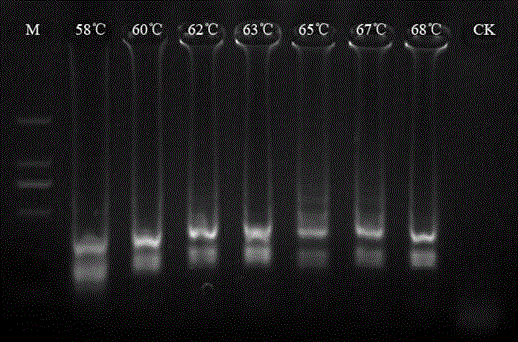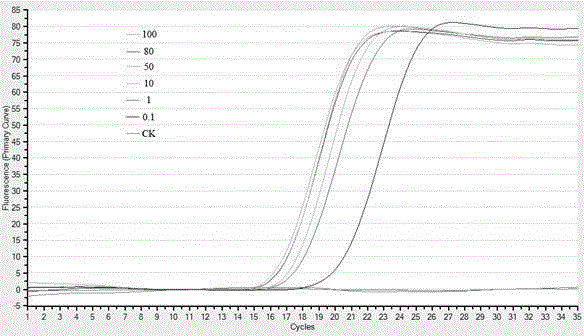Loop isothermal amplification primer for quickly detecting tylenchulus semipenetrans and application of loop isothermal amplification primer
A ring isothermal amplification, citrus technology, applied in the determination/inspection of microorganisms, biochemical equipment and methods, DNA/RNA fragments, etc. Use and other issues to achieve good detection effect, good sensitivity, and visualization.
- Summary
- Abstract
- Description
- Claims
- Application Information
AI Technical Summary
Problems solved by technology
Method used
Image
Examples
Embodiment 1
[0031] Example 1 Design of primers
[0032] Primers were designed according to the ITS DNA sequence of the citrus puncture nematode in NCBI (gene accession numbers: FJ969705, GU433381 JN112270, JN112269, GU433403, GU433405), and the primer design was carried out using the software PRIMEREXPLORER v.4 software (http: / / primerexplorer.jp) .
[0033] The designed primers and their sequences are as follows:
[0034] TSF3 (as shown in SEQ ID NO.1):
[0035] GCATCTGGCGAGTCTGTG.
[0036] TSB3 (as shown in SEQ ID NO.2):
[0037] GCACCGAATCTGGAACTCAT.
[0038] TSFIP (as shown in SEQ ID NO.3):
[0039] CRGGTAAGAGCCGAgaAGGACAggatccGTCATACTTCCTCTgcCGCT.
[0040] TSBIP (as shown in SEQ ID NO.4):
[0041] TGTAACGCTGAGCgaCTGTTGAttttttGCGACATGTGGAGAAGGC.
Embodiment 2
[0042] Example 2 Optimization of primer reaction conditions
[0043] 1. Reaction temperature (primer annealing temperature) optimization
[0044] The annealing temperature of the above primers was optimized using Nematode citrus hemipuncture DNA as a template.
[0045] (1) DNA extraction
[0046] The extraction of the DNA is carried out according to conventional methods in the art. This example is carried out using the method described in Subbotin et al. (2008), specifically as follows: collect nematodes by centrifugation or pick 1 nematode under a stereoscope, then add 16 μL sterilized double-distilled water, 2 μL 10 ×PCR buffer (Mg-free 2+ ) (purchased from Takara) and 2 μL of proteinase K (600 mAnson U / mL) (purchased from Takara), then the nematodes were cut with a needle, and then the mixture was placed at 65°C for 1h and 95°C for 15min.
[0047] (2) PCR reaction
[0048] PCR reaction system: 1 μL DNA, 1.6 μM primers TSFIP / TSBIP, 0.2 μM primers TSF3 / TSB3, 0.35 μM dNTP...
Embodiment 3
[0057] Visual detection and detection sensitivity of embodiment 3LAMP reaction
[0058] 1. In summary, the ring isothermal amplification method for the rapid detection of citrus hemipuncture nematode established by the present invention is as follows:
[0059] PCR reaction system: 1 μL DNA, 1.6 μM primers TSFIP / TSBIP, 0.2 μM primers TSF3 / TSB3, 0.35 μM dNTP, 2.5 μL 10× BST 2.0 DNA polymerase buffer ( BST 2.0 DNA polymerase buffer), 0.8M betaine, 1.5 μL MgSO 4 (100 mM), 1 μL BST 2.0 DNA polymerase ( BST 2.0 DNA polymerase), balance ddH 2 O make up to a total of 25 μL.
[0060] Reaction conditions: react at 65°C for 60 minutes.
[0061] 2. Carry out LAMP reaction according to the above reaction system and optimized reaction conditions. After the reaction, it can not only be detected by agarose gel electrophoresis, but also can be detected visually by adding SYBR Green I dye or calcein. The result judgment method is more accurate. Flexible and more convenient.
[006...
PUM
 Login to View More
Login to View More Abstract
Description
Claims
Application Information
 Login to View More
Login to View More - R&D Engineer
- R&D Manager
- IP Professional
- Industry Leading Data Capabilities
- Powerful AI technology
- Patent DNA Extraction
Browse by: Latest US Patents, China's latest patents, Technical Efficacy Thesaurus, Application Domain, Technology Topic, Popular Technical Reports.
© 2024 PatSnap. All rights reserved.Legal|Privacy policy|Modern Slavery Act Transparency Statement|Sitemap|About US| Contact US: help@patsnap.com










